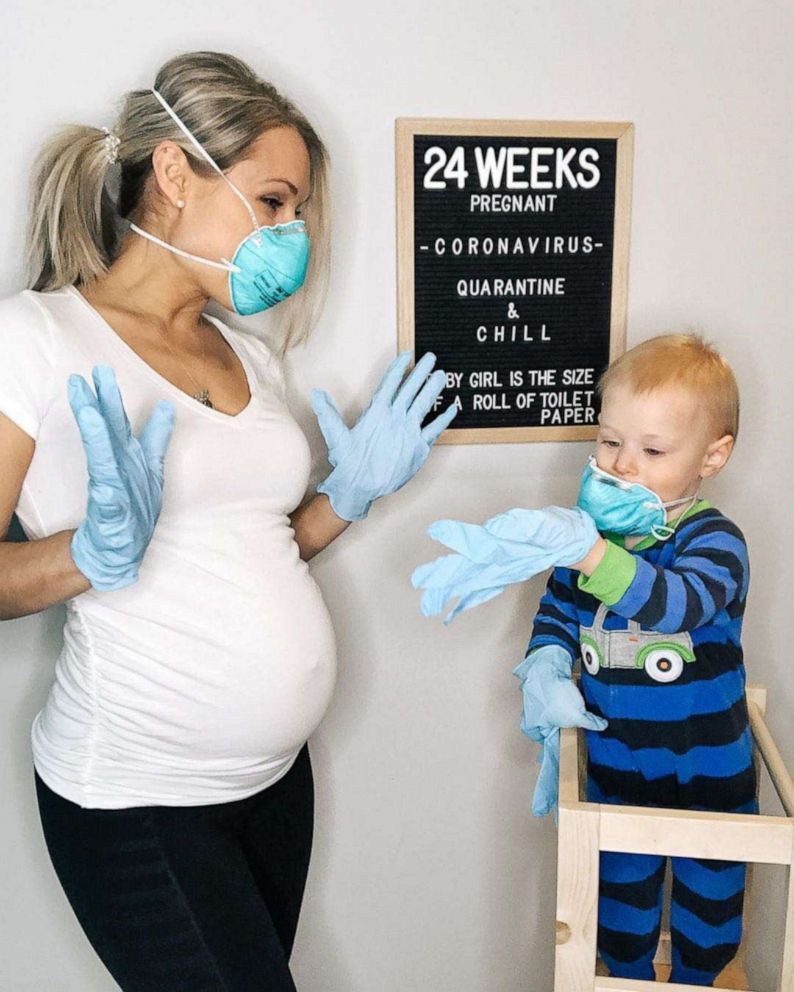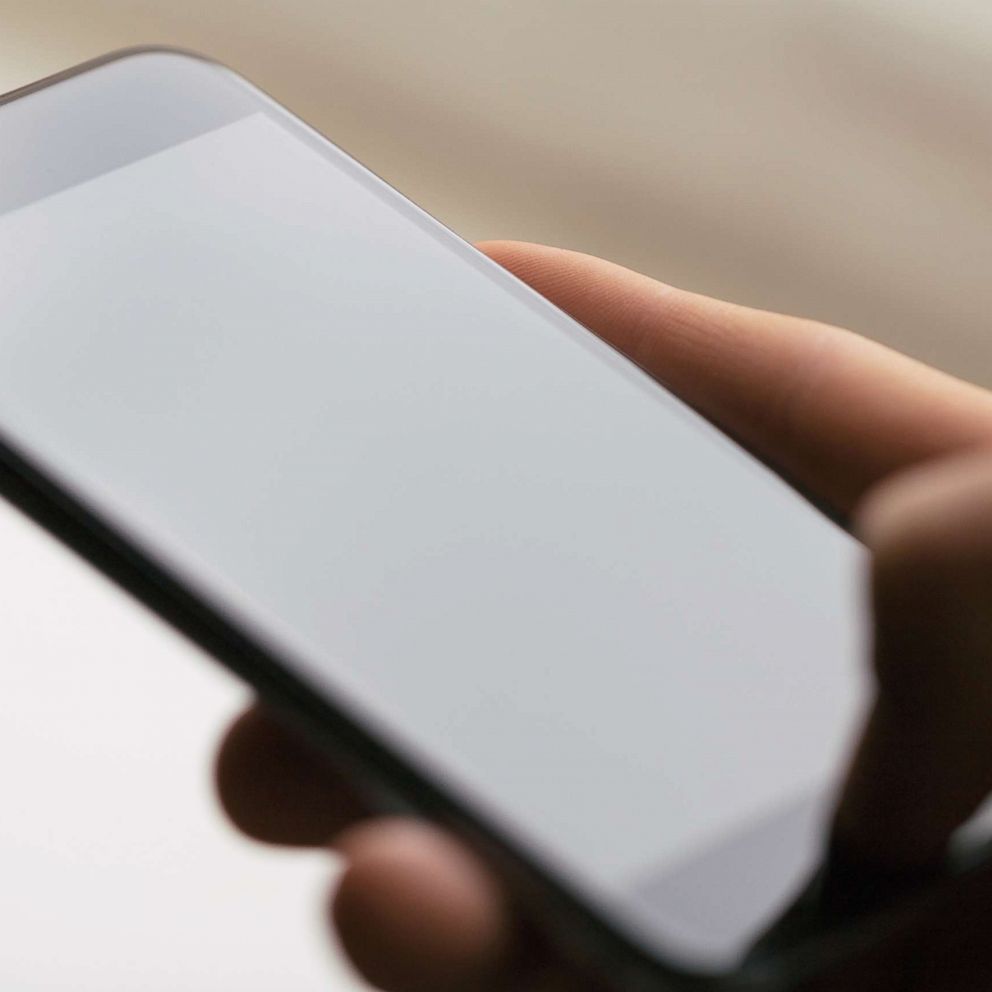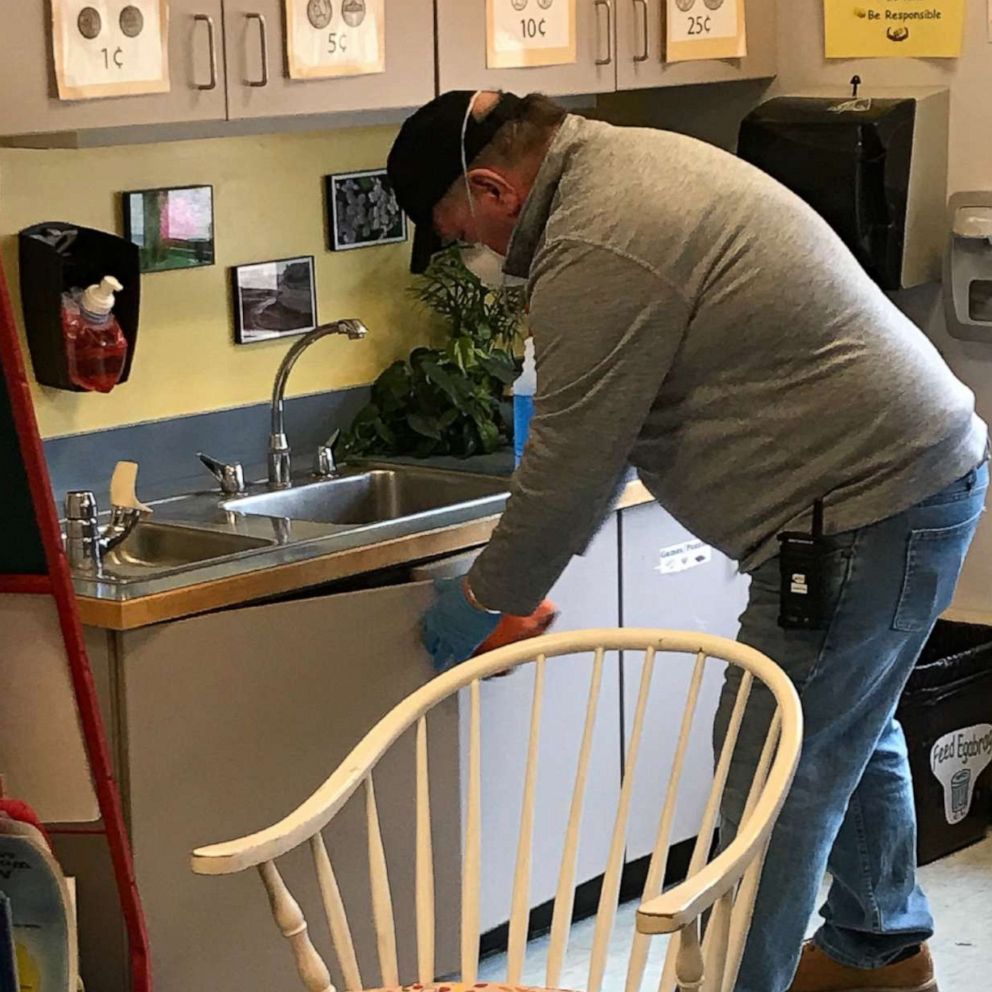I'm a nurse who's pregnant amid the novel coronavirus outbreak. Here's how I'm coping.
Heather Hodnicki of Hamilton, New Jersey, is 26 weeks along.
A nurse who is pregnant during the novel coronavirus outbreak is sharing important facts for other expectant mothers who may be on-edge during these unprecedented times.
Heather Hodnicki of Hamilton, New Jersey, is 26 weeks along. The mom of one recently shared a PSA with her 20,000 Instagram followers, urging them to keep calm and practice safe health practices amid the pandemic.
"There's not much that has been proven on pregnant women or if it could pass to your baby," Hodnicki told "Good Morning America."
She went on, "That is scary, along with the high risk of being exposed because you are working in a hospital or medical facility. I think everyday that goes by people are more anxious and scared. I try to reassure myself mentally."
Hodnicki is mom to 18-month-old Cole and a nurse at an in-patient acute rehab facility. She's expecting a girl June 29.

The outbreak of coronavirus, or COVID-19, as it's officially known, has led pregnant women to question everything from whether they should travel to whether they should work from home, self-quarantine or are fine to continue their lives as normal.
Because COVID-19 is a new virus, there are no published scientific reports on whether pregnant women are more susceptible than the general population. The U.S. Centers for Disease Control and Prevention does point out though that pregnant women do have weakened immune systems and may be more susceptible to viral respiratory infections, including COVID-19, so should be considered an at-risk population for COVID-19.
Based on data from previous coronaviruses, like SARS and MERS, some experts believe pregnant women may be at higher risk for severe illness and death, but that data is limited and inconclusive.
For now, neither the CDC nor the American College of Obstetricians and Gynecologists recommends any specific guidance for pregnant women beyond what's recommended to the general public.
While Hodnicki is still working with hospital patients, she expects to not be assigned to those who have COVID-19. There are no known cases of COVID-19 at her hospital, according to Hodnicki.
"We took precautions when there was a COVID-19 scare days ago, but the patient tested negative," she said. "That shows how real the situation is."
Hodnicki learned she was pregnant with this current child after having a miscarriage in August of 2019. She said the experience changed her way of thinking during the COVID-19 outbreak.
"I have a totally different outlook with this pregnancy and everything I come into contact with," she said. "[As mothers] we want to protect our growing fetus the second we see that positive line."
It's unknown whether a pregnant woman with coronavirus could pass the virus to her fetus before, during or after delivery, according to the CDC.
There are a few recent cases of infants born to women with coronavirus. While initial reports were encouraging with no infants contracting COVID-19, three reports released on March 26 showed that infants may be at risk of the virus being passed from mother to infant before birth. Although data is now mixed, all of these infants have either had no or mild illness and recovered without complication.
On March 14, Hodnicki shared photos on Instagram to mark her 24th week of pregnancy. She and her toddler were wearing expired personal protective equipment, as there are a shortage of masks in the U.S.
Hodnicki said she wore gloves and a mask to draw attention to the information listed in the caption.
Hodnicki's post was accompanied by everyday precautions that people -- pregnant or not -- should take to prevent COVID-19.
Hodnicki said quite a few pregnant women have reached out in regards to her post. She's been offering an ear to listen as well as safety measures in accordance with the CDC.
"Keep calm and follow the general precautions that are suggested to the public," Hodnicki said of the advice she gives.
Here are the health and safety guidelines listed in Hodnicki's post, along with the CDC's recommendations.
Wash your hands, don't touch your face, eyes or mouth
Hodnicki reminded the importance of hand washing: "Scrub for at least 20 seconds, sing "Happy Birthday" twice," she wrote.
The CDC offers the same guidelines, recommending the general public, including pregnant women, take "everyday preventive actions" to help stop the spread of germs, including getting a flu vaccine, washing your hands, avoiding touching your eyes, nose and mouth, staying home when sick and avoiding close contact with people who are sick.
Social distancing
Person-to-person transmission is mostly likely between people in close contact, within about 6 feet, according to the CDC. When a person infected with novel coronavirus sneezes or coughs, respiratory droplets could land on people nearby or possibly be inhaled by those people.
Further precautions, including avoiding crowds and stocking up on supplies, are recommended only for older people or people with severe chronic conditions like diabetes, heart disease and lung disease.
Disinfect frequently touched areas and clean your phone
According to the World Health Organization, "studies suggest that coronaviruses (including preliminary information on the COVID-19 virus) may persist on surfaces for a few hours or up to several days."
The WHO said, "If you think a surface may be infected, clean it with simple disinfectant to kill the virus and protect yourself and others."
The CDC said, "It may be possible that a person can get COVID-19 by touching a surface or object that has the virus on it and then touching their own mouth, nose, or possibly their eyes, but this is not thought to be the main way the virus spreads."
This is how long you actually need to wash your hands
If you're feeling symptomatic
Pregnant women should call their doctor before going to the hospital if showing symptoms. A hospital visit is not always necessary and could put you at risk for exposure to other sicknesses. If you are having problems breathing you should seek medical help immediately.
Novel coronavirus can cause symptoms ranging from mild to severe, including cough, fever and shortness of breath. Since the symptoms are similar to those of pneumonia, influenza and the common cold, only a diagnostic test can confirm whether an individual has coronavirus.
Don't wear a face mask unless you're already sick
The CDC said healthy people should not wear a mask, and doctors warn that fiddling with putting on and taking off a mask could backfire by exposing germs on your hands to your face.
Moreover, there is a severe shortage of masks which protect health care workers from contracting COVID-19.
The U.S. has a stockpile of 13 million N95 respirator masks. But the federal government has said up to a billion might be needed over the next six months.
"Please consider donating any unused masks to your hospitals who are in dire need," Hodnicki wrote in her post.
For more on pregnancy and COVID-19, read Coronavirus and pregnancy: Your questions answered.
ABC News' Zoe Moore contributed to this report.







